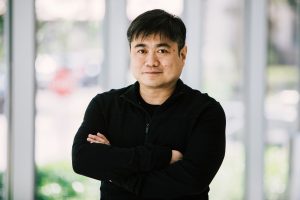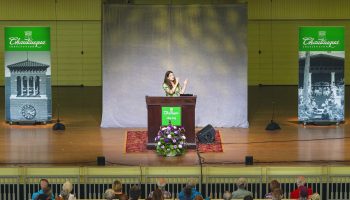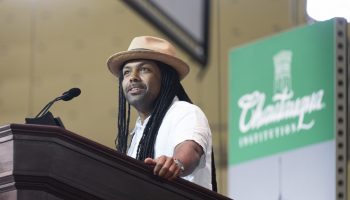
Joi Ito used to think the internet would save the world.
“In the early days I thought that we could just connect everybody together and we would have world peace; we just needed to give everyone a voice,” Ito said. “It turns out, that’s not true.”
Ito is an activist, entrepreneur and venture capitalist who has served as the director of the MIT Media Lab for the last eight years. He will be speaking at 10:45 a.m. Wednesday, August 14 in the Amphitheater as part of Week Eight, “Shifting Global Power.”
Ito calls himself a “reformed techno utopian.”
“This techno utopianism that we had 30 years ago was misguided,” he said. “I think I’m still long-term optimistic, but short-term, quite disconcerted with the ways that things have developed.”
Ito said many of the things he finds disconcerting about the state of current technological development are a result of the increased importance of quantitative sciences over the humanities.
“Economics, law and engineering (are) the primary stewards of society,” he said. “We’ve come to a very scalable, but a very reductionist, way that we manage resources and power.”
Even before he became the director of the “anti-disciplinary” research lab at one of the world’s top science and engineering schools, Ito had an extensive career overseeing, investing in and writing about new technology.
In today’s lecture, Ito will discuss the ideas outlined in his recent Ph.D. dissertation, The Practice of Change, and his two books, Whiplash: How to Survive Our Faster Future (co-authored by Jeff Howe) and Resisting Reduction: Designing Our Complex Future with Machines, which came out this year.
Much of his work centers on the need to reintroduce the humanities and social sciences into conversations about solving the world’s problems.
“Thinking about it from an MIT perspective, we’re a university where we have social sciences, but they really don’t have resources or power,” Ito said. “Ethics and those qualitative things are sort of bolted on when necessary.”
Ito said he and his fellow techno utopians’ belief in the benevolent power of the internet could have benefitted from the influence of the humanities.
“All the engineers thought it was just a great idea to connect everyone together (through the internet) — a pretty naive idea,” Ito said.
In talks with Susan Silbey, MIT’s Leon and Anne Goldberg Chair of Humanities, Anthropology and Sociology, Ito said Silbey quickly came to a realization when she heard that the internet would connect people across the world: “I knew it was going to be a mess,” Silbey would say.
“I think the role of social science and the humanities is not just the check- box ethicist on engineering programs,” Ito said, “but to actually ask whether we’re even asking the right questions or trying to solve the right problems.”
In his work, Ito focuses on issues like climate change, social inequality and redesigning the systems that support technology and science. He said the philanthropic and impact investment groups attempting to solve these problems often try to boil them down to figures.
“What we need to do to solve society’s problems is really to embrace complexity and understand that we can’t reduce the world to an optimization or a scalar function,” Ito said. “Whether we’re talking about climate change or societal inequity or public health, we’re not going to solve it through economic policies or laws or just fiddling with the rules. I think we’re going to have to have a dramatic paradigm shift of behavior change.”
Avoiding reducing the world to a scalar function, or a one-dimensional outcome, requires collective behavioral change. And as Ito sees it, this behavioral change means shifting away from a culture that celebrates financial wealth and material abundance. Ito cites adoptive godfather Timothy O’Leary and his contemporaries as influences.
“I spend a lot of time with ex-hippies,” he said. “I think the hippie movement was a shot on goal to pivot away from a materialistic approach, and I think the feminist movement and the Civil Rights Movement and others were (similarly) shots on goals.”
He is heartened by current movements like Friday Amp speaker Tarana Burke’s Me Too Movement and the March for Our Lives. He recognizes the important role social media plays in spreading social justice movements in the 21st century.
“That comes from the (same) tool that brought us this polarized society that we’re all afraid of,” he said. “We can and should improve the tools, but … I don’t think it’s as much about the tools as it is about the mindset and paradigm of the people who use the tools. I think that the intervention is going to be a cultural one, and I think the cultural one happens through arts, and it happens through empathy.”
Though he believes younger generations are already beginning this cultural shift, when it comes to issues like climate change, Ito doesn’t sugarcoat how much damage has already been done.
“I think it’s going to get worse before it gets better; it’s very unlikely that there’s a way forward where it doesn’t really suck for a lot of people,” he said. “We’ve borrowed against the future and I think the further you go into the future for the next few generations the worse it’s going to suck, and the worse it sucks, the more likely they are to have different values than us — because they’re going to think we screwed up.”
To prevent even more damage in what is a critical time frame, Ito believes it is vital to combat engineers and scientists who still hold his former beliefs in techno utopianism and think that “if we just develop a superintelligence, we can compute our way out of all our problems.”
“I am a reformed techno utopian that is reaching out to the cultural and social side of society, seeking both collaboration and forgiveness and hoping that it’s not too late to bring humanity back into the goal of our system,” he said. “The only way that we’re going to get there is by working together and reintegrating culture and values as the primary driver for what we do. … And it’s going to be a really hard battle, and it’s going to come through conversation and shared values — not through fighting.”





